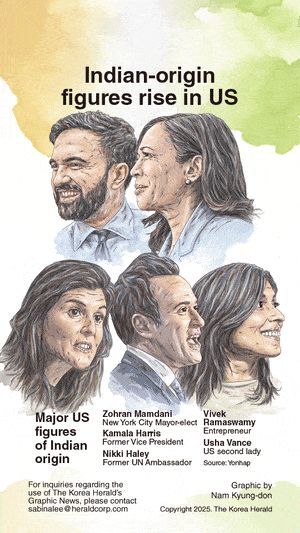 BTS, Stray Kids, Ateez, and now Saja Boys. These are the only K-pop boy bands that have cracked the US Billboard Hot 100. However, Saja Boys is a fictional K-pop boy band composed of Korean demons (joseung saja or Korean grim reapers) from the animated Netflix film, “KPop Demon Hunters.”
BTS, Stray Kids, Ateez, and now Saja Boys. These are the only K-pop boy bands that have cracked the US Billboard Hot 100. However, Saja Boys is a fictional K-pop boy band composed of Korean demons (joseung saja or Korean grim reapers) from the animated Netflix film, “KPop Demon Hunters.”
The film is currently dominating Netflix in the US, sitting at No. 1 and ranking in the Top 10 Netflix films across 93 countries. What’s more, seven of its tracks have landed on the July 12 US Billboard Hot 100 Chart. The fictional girl group in the film, Huntrix, is also making waves. These chart-topping tunes include: “Golden” by Huntrix (No. 23), “Your Idol” by Saja Boys (No. 31), “How It’s Done” by Huntrix (No. 42), “Soda Pop” by Saja Boys (No. 49), “What it Sounds Like” by Huntrix (No. 55), “Free” by Rumi (Ejae) and Jinu (Andrew Choi) (No. 58), and “Takedown” by Huntrix (No. 64).
In a surprising twist, the fictional boy group Saja Boys has already outperformed most real K-pop boy bands on the US Billboard Hot 100 chart, second only to BTS. Of course, there are real voices behind these animated characters, with Andrew Choi lending his vocals to Jinu.
Choi is no stranger to the K-pop scene, having worked as a songwriter, producer, and vocal coach for numerous K-pop entertainment companies, with his closest ties to SM Entertainment. He also made waves in Season 2 of K-pop Star, finishing in third place. His voice, in my opinion, is tailor-made for city pop, with an ethereal quality and depth that perfectly embodies the deceptively youthful yet ancient demon Jinu (who bears a striking resemblance to an animated Cha Eunwoo).
I recently had the pleasure of sitting down with Andrew Choi. He’s still reeling from the film’s and soundtrack’s runaway success. Despite his significant contributions – he’s the lead vocalist on three tracks currently on the US Billboard Hot 100 – Choi remains remarkably humble.
So, how did this unexpected journey unfold?
Andrew’s story begins in Busan, South Korea, where he was born before his family relocated to New Jersey when he was five. Music has always been his north star. “I was an avid listener of K-pop until H.O.T.’s second album… I especially loved solo artists like Shin Seunghun and Kim Gun Mo,” he reminisces. His musical palette also includes 90s R&B icons like Musiq Soulchild, Usher, and Justin Timberlake. While pursuing Computer Science and Psychology at Rutgers University, he fronted the alternative rock band “The Ides” for over four years before the group disbanded.
At around 30, Choi made the bold move to Korea to teach English, but music’s siren call proved irresistible. “I entered the industry just as a songwriter, and that happened randomly,” he explains. A chance meeting with a track maker led to collaborative songwriting sessions. They rented a music studio, and fate intervened when songwriter Kim Tae-seong, retrieving a forgotten bag, overheard Andrew’s vocals.
“He told me he had a couple of tracks and asked if I would write songs over them. He sent me two tracks and that night I went back to the studio and recorded a very rough demo of one of the songs,” Choi recounts. That impromptu recording would become SHINee’s hit “Beautiful.”
It was only later that Andrew learned the tracks were the work of legendary producer Teddy Riley, the mastermind behind Michael Jackson’s “Remember the Time” and Bobby Brown’s “My Prerogative,” among countless other chart-toppers.
This serendipitous encounter paved the way for Choi’s stint on K-pop Star. While he enjoyed the experience, he found his true calling behind the scenes as a songwriter.
But how did Choi transition from songwriter to the voice of Jinu? Enter Ejae, the voice behind Rumi (Huntrix’s leader in the film). The two first crossed paths at a church event and quickly hit it off. Ejae, a powerhouse songwriter in her own right with credits on hits like Red Velvet’s “Psycho” and aespa’s “Drama,” played a pivotal role in shaping the film’s soundtrack.
Initially, Andrew provided guide vocals for “Soda Pop.” But as production neared its end, he received an unexpected call to “come in to record.” Assuming he’d be finalizing “Soda Pop,” he was caught off guard when asked to lend his voice to “My Idol” and “Free.” The kicker? “By the way, you’re doing Jinu,” they told him. Despite the pressure of recording in front of an audience, Choi found solace in their warmth and encouragement.
Recently, Andrew stepped into the spotlight with his own single, “Under Your Skin,” a sultry R&B jazz ballad that’s likely to strike a chord with 90s music aficionados, evoking memories of Usher’s soulful ballads. For those of us with a few more years under our belts, it might conjure up classics like Harold Melvin and the Blue Notes’ “If You Don’t Know Me by Now,” Champagne’s “How ‘Bout Us,” or Heatwave’s “Always and Forever.” In Korea, comparisons to The Black Skirts’ “Everything” wouldn’t be far off. And there’s more where that came from – additional singles are in the pipeline.
What I find particularly endearing about the film is its universal message of love and redemption, cleverly interwoven with inside jokes for Koreans and K-pop enthusiasts. While the dialogue is in English, the film’s Korean essence remains intact. These are unequivocally Korean idols (or Korean demons), and the concerts unfold in a distinctly Korean cityscape. There’s no attempt to transplant the action to LA or New York.
The soundtrack is a catchy collection of “K-pop-esque” tunes that eschew overly complex structures. In my experience, the best pop songs often have a deceptive simplicity – an effortless quality that’s notoriously difficult to achieve. Andrew hit the nail on the head when he observed, “The songs are sophisticated in their simplicity.”
Grace Kao
Grace Kao is an IBM professor of sociology and professor of ethnicity, race and migration at Yale University. The views expressed here are the writer’s own. — Ed.










Most Commented